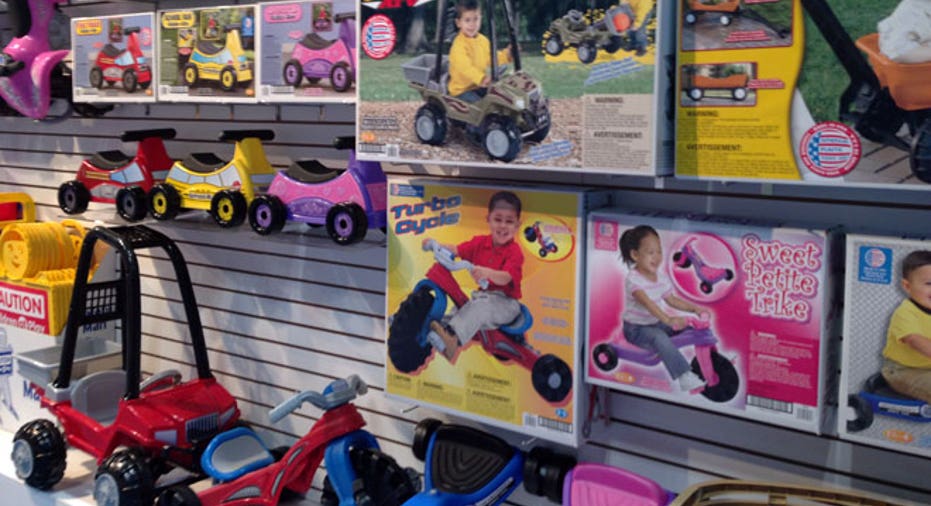Made-in-America Toy Companies Shine Bright at NYC Event

While industry giants like Ty and LEGO may dominate the Toy Industry Association’s 2013 Toy Fair, smaller made-in-America companies were well-represented during the four-day event, held at New York City’s Javits Center. FOXBusiness.com spoke with three participating American-made toy producers – including a plastic toy company that just celebrated its 50th birthday and a 3-person venture that launched just last May – to find out more about their hot toys, and what it means to be “made in America” in the toy industry. Each of the toy-making entrepreneurs shared one core belief: that the benefits of producing toys domestically outweigh any possible negatives, like greater labor costs or fewer suppliers. Buffalo Games: A Leading Puzzle Maker Buffalo Games, which labels itself as the No. 1 jigsaw puzzle maker for adults in North America, also produces party games such as Last Word, Truth Be Told and Celebrity Throwdown. The company's top sellers are 1,000-piece puzzles featuring American folk art, like that of artist Charles Wysocki, or iconic American brands, like Coca-Cola and Harley Davidson. Despite a roughly flat year for the puzzle industry as a whole, Buffalo Games reported a 20% increase in sales from 2011, selling roughly 2.5 million puzzles last year. Account executive Tom Lang attributes the increase in sales to the consumer’s appreciation for high-caliber jigsaw puzzles. “Producing in America allows us to concentrate on making high-quality puzzles. We focus on the thickness of the pieces – the way they snap together – and the images themselves,” says Lang. Founder and president Paul Dedrick agrees that domestic production is a major contributor to Buffalo Games’ success. “After 15 years of outsourcing our production to manufacturers around the country, we decided that we wanted to be closer to our process, and built our factory in Buffalo, NY," Dedrick said. "By producing in the U.S., we feel that we are best able to serve our retail partners, because we’re able to quickly respond to their demands.” Toydozer: An Innovative Clean-Up Toy Toydozer creator Amy Bradley says she first got the idea for a “clean-up toy” when watching her son Harry dump his LEGOs all over the floor. “I wanted to help kids participate in the clean-up process and actually enjoy the responsibility,” she said. So, Bradley hired an engineer to prototype the two-part set, and officially launched Toydozer in May 2012. Toydozer wasn’t always a “Made in the USA” company, though – the first run of Toydozers was produced in Mexico, which Bradley says she opted for as a money saver. Upon receiving the first shipment, however, Bradley was forced to rethink her manufacturing process: 80% of the Toydozers were damaged due to poor quality control. Today, Bradley says, Toydozer is proudly produced in Hatfield, PA. “Originally, I hadn’t even thought to look in the United States for a manufacturer,” says Bradley. “But unit costs are actually lower in Pennsylvania, because our manufacturer is willing to work with us on the price.” Toydozer started selling its USA-made set right before the December 2012 holiday season. According to Bradley, thanks to media appearances – and lots of publicity on “mom” blogs – approximately 3,000 Toydozers have been sold, and the company is now shipping the clean-up toy to retailers in more than 20 states. American Plastic Toys: Classic Seasonal Toys For 51 years, American Plastic Toys has been making classic “role playing” toys like plastic kitchens and riding trucks, as well as seasonal favorites like sand buckets and shovels. President John Gessert, who worked his way up from college-intern status and has been running the show for the past decade, credits the company’s continuing success to its Walled Lake, MI location. “While labor costs are higher in the U.S., we take comfort in being able to control our manufacturing process,” says Gessert. “Additionally, since our toys are big and bulky, domestic production helps offset costs, as shipping from an international manufacturer would be extremely expensive.” Proximity to Detroit is a plus for American Plastic Toys, says Gessert, as an emphasis on engineering has created a pool of talented workers. Additionally, he says, the “Made in USA” label contributed to American Plastic Toys’ double-digit growth last year. “Recently, this distinction has really started to resonate with people. Frequently, we get emails from consumers, just to thank us for keeping jobs in the United States,” Gessert said.



















